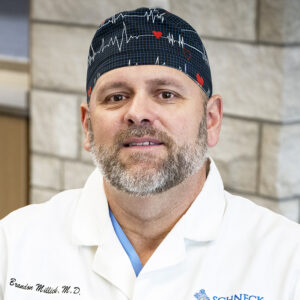Bariatric Surgery Overview
Bariatric surgery or weight loss surgery, modifies the stomach and digestive system to support weight loss. These surgeries are performed by bariatric surgeons to reduce the risk of obesity-related health issues like heart disease or stroke. This type of medical weight loss procedure is often recommended when conventional methods like diet and exercise are ineffective in achieving a healthy weight.
Your health is yours so it’s important to make an informed decision before moving forward with this procedure. Understanding the requirements of bariatric surgery will help you carefully consider this option. Schneck is here to assist you in your health journey by addressing frequently asked questions about bariatric surgery.
What's the Weight Qualification for Bariatric Surgery?
Bariatric surgery is typically considered for adults with a body mass index (BMI) of 35 or higher. To determine if you qualify for bariatric surgery, we conduct an assessment to look at factors such as previous attempts at weight management through diet and exercise. Weight loss may not be a strict requirement for bariatric surgery, although some insurance policies may request it. A team of professionals, including a surgeon, dietician, and nurse practitioner collaborate with you to establish a goal based on your BMI and abdominal examination.
Which Bariatric Surgery Is the Best at Schneck?
Surgeons at Schneck Bariatrics generally offer two types of bariatric surgery. The Sleeve Gastrectomy is the most commonly performed procedure, reducing the size of the stomach to control hunger and limit food intake. Each patient's needs are assessed to determine a suitable option. There are several options for bariatric surgery, your surgeon will help you decide what is right for you.
What Can I Eat after Bariatric Surgery?
After bariatric surgery, your diet will go through several phases. Initially, you'll start with a clear liquid diet to stay hydrated and avoid stomach irritation. Then, you'll progress to a full liquid diet, consuming protein shakes and milk products. Next comes the soft food diet, introducing options like scrambled eggs and hot cereals. Around week 7, you'll transition to a regular diet of protein and raw fruits and vegetables while being mindful of portion sizes. It's important to avoid carbonation, sugary drinks, gum, spicy foods, and caffeine to prevent irritation.
What Is the Recovery Time for Bariatric Surgery??
Immediately following bariatric surgery, most patients can walk within a few hours and will begin their liquid diet the next day. They will often stay in the hospital for one to two days before going home. Additionally, patients can return to work within two to four weeks, and
possibly sooner if working from a home office. While we encourage individuals to get up and walk around after the procedure, engaging in heavier-impact activities like sports may require a six-week recovery time to be safe.
How Long Does It Take to Lose Weight after Surgery?
When considering weight loss after bariatric surgery, a realistic outlook is helpful. Weight loss varies among individuals, with an average of two or three pounds per week in the year following surgery. While some weight regain may occur later on, stability is typically achieved within two to three years, accompanied by improvements in obesity-related diseases.








